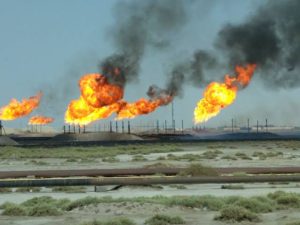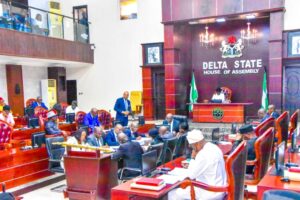THE RIGHT PATH TO END GAS FLARE ON COURSE – AS FG ADOPTS NGFCP REPORT ON SOQS EVALUATION EXERCISE
By Zik Gbemre
With recent reports that the Federal Government has approved the Statements of Qualification (SOQs) Evaluation Report presented by the Inter-Ministerial Committee of the Nigerian Gas Flare Commercialization Programme (NGFCP), we believe this is an assuring development on the Federal Government’s promise of harvesting flared Gas for the economic advantage of the country with its NGFCP initiative.
According to reports, a statement signed by the Program Manager of the Scheme, Mr. Justice Derefaka, revealed that the Permanent Secretary, Ministry of Petroleum Resources, Dr. Folasade Yemi-Esan, conveyed the approval in her supervisory capacity over the affairs of the Ministry following the successful completion of the evaluation exercise which was carried out from 17th – 25th June, 2019 in Lagos by the NGFCP Proposal Evaluation Committee (PEC).
It would be recalled that over 850 interested parties registered their interest in the NGFCP while 238 Applicants submitted Statement of Qualification (SOQs) in response to the Request for Qualification (RfQ) published by the Department of Petroleum Resources (DPR). While a total of 238 SOQ documents were evaluated in accordance with the provisions of applicable Regulations, Guidelines, Standard DPR Practices for bid evaluation, and were adjudged either a “Pass” or “Fail” status. Following a rigorous exercise conducted in line with established protocol and using the Electronic Evaluation Tool (EET), 205 Applicants emerged successful (attaining a “pass status”) while the remaining 33 Applicants did not meet the minimum requirements and thus attained “fail status”.
It was also noted that; “the Proposal Evaluation Committee (PEC) in the next stage, which is the Request for Proposals (RfP), will evaluate proposals submitted by the Qualified Applicants to determine those Bidders that achieve Preferred Bidder and Reserved Bidder status in line with the criteria of the Request for Proposals (RfP) package”. Ahead of the Request for Proposal stage, an NGFCP Qualified Applicants’ Workshop is scheduled to hold on Monday, 19th August 2019 at the Petroleum Technology Development Fund (PTDF) Towers, Abuja. Attendance is strictly on invitation.
With reports that there are currently over 16,000 flare sites in 90 countries all over the world with over 150BCM gas flared annually, and that a considerable number of these flare sites are in Nigeria. This is enough to produce 750 billion kWh power, which is more than the entire power consumption on the African continent annually. We are however glad that the Federal Government has taken a position that companies flaring gas may not have their operating license renewed by 2020, since there are huge economic opportunities for energy conversion, as well as notable companies bidding for flared sites for commercial purposes. The good thing about all of these objectives of the NGFCP initiative, is the “pace” and “politicalwill” being exhibited by the Federal Government through the Office of the Ministry of Petroleum Resources, to see that it becomes a reality in no distant future.
It is evident that the NGFCP is a very worthy venture that should be encouraged by all stakeholders in and outside the industry, and there is need for relevant Federal Government authorities as well, to see that it becomes a reality. We also admonish that President Buhari and the relevant Authorities in the Federal Ministry of Petroleum Resources, should be encouraged by all stakeholders in the oil and gas industry to ensure that the Government’s ongoing Gas Flare Commercialization programme, which will liberalize the development of the nation’s gas sector and greatly improve the supply of power, actually becomes a “reality”.
It has been noted severally that Gas flaring not only wastes valuable energy, which can be used to transform the nation’s electricity problems, but it also has significant detrimental effects on the environment and the overall economy. For instance, the implication of gas flaring on human health are all related to the exposure of those hazardous air pollutants emitted during incomplete combustion of gas flare. These pollutants are associated with a variety of adverse health impacts, including cancer, neurological, reproductive and developmental effects. Apart from the Health Impacts (HIs), it is believed that gas flaring also negatively affects the agricultural aspects. And as such, it causes great loss to subsistent farming and even hunting, which are some of the basic occupations of the locals in the Niger Delta region.
It has been noted severally that Gas flaring not only wastes valuable energy, which can be used to transform the nation’s electricity problems, but it also has significant detrimental effects on the environment and the overall economy. For instance, the implication of gas flaring on human health are all related to the exposure of those hazardous air pollutants emitted during incomplete combustion of gas flare. These pollutants are associated with a variety of adverse health impacts, including cancer, neurological, reproductive and developmental effects. These are some of the things those in the Niger Delta region are daily exposed and subjected to, but no one is talking about that. These difficulties and problems faced by local communities from gas flares are a sufficient justification for ending gas flaring practice. Fines by defaulting companies should be so exorbitant so as to deter them while the gas can be processed and produced into cooking/domestic gas. The time to stop it is now and the place to stop it is here in Nigeria.
Zik Gbemre.
National Coordinator
Niger Delta Peace Coalition (NDPC)
We Mobilize Others to Fight for Individual Causes as if Those Were Our Causes




